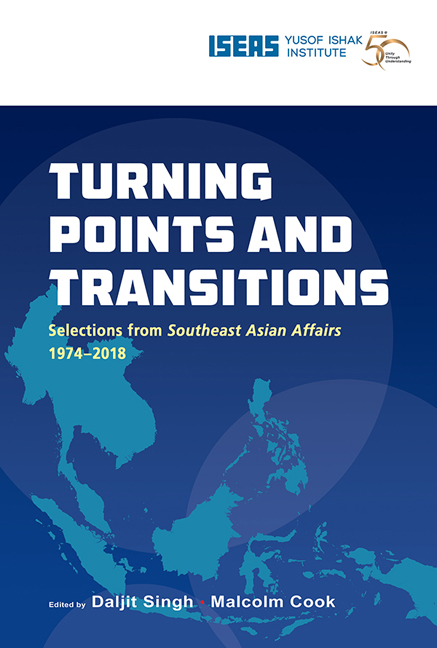Book contents
- Frontmatter
- Contents
- Message from the Director
- Foreword
- Foreword
- Introduction
- THE REGION
- The Diplomatic Emergence of China and Its Implications for Southeast Asia (1975*)
- Stability and Security in the Region after ANZUK (1975)
- The Question of the “Overseas Chinese” (1976)
- Southeast Asia 1976: The Handling of Contradictions (1977)
- The “Fukuda Doctrine” and Its Implications for Southeast Asia (1978)
- Expanding Horizons in Southeast Asia? (1994)
- AFTA in the Light of New Economic Developments (1995)
- The ASEAN Economic Miracle Unravels (1999)
- Southeast Asia in 1999: A False Dawn? (2000)
- East Timor's Future: Southeast Asian or South Pacific? (2001)
- Southeast Asia in 2002: From Bali to Iraq — Co-operating for Security (2003)
- The Year in ASEAN: The Charter, Trade Agreements, and the Global Economic Crisis (2010)
- Seeking Stability in Turbulent Times: Southeast Asia's New Normal? (2015)
- China's Two Silk Roads Initiative: What It Means for Southeast Asia (2015)
- China's International Strategy and Its Implications for Southeast Asia (2016)
- BRUNEI
- CAMBODIA
- INDONESIA
- LAOS
- MALAYSIA
- MYANMAR
- THE PHILIPPINES
- SINGAPORE
- THAILAND
- VIETNAM
The ASEAN Economic Miracle Unravels (1999)
from THE REGION
Published online by Cambridge University Press: 29 May 2019
- Frontmatter
- Contents
- Message from the Director
- Foreword
- Foreword
- Introduction
- THE REGION
- The Diplomatic Emergence of China and Its Implications for Southeast Asia (1975*)
- Stability and Security in the Region after ANZUK (1975)
- The Question of the “Overseas Chinese” (1976)
- Southeast Asia 1976: The Handling of Contradictions (1977)
- The “Fukuda Doctrine” and Its Implications for Southeast Asia (1978)
- Expanding Horizons in Southeast Asia? (1994)
- AFTA in the Light of New Economic Developments (1995)
- The ASEAN Economic Miracle Unravels (1999)
- Southeast Asia in 1999: A False Dawn? (2000)
- East Timor's Future: Southeast Asian or South Pacific? (2001)
- Southeast Asia in 2002: From Bali to Iraq — Co-operating for Security (2003)
- The Year in ASEAN: The Charter, Trade Agreements, and the Global Economic Crisis (2010)
- Seeking Stability in Turbulent Times: Southeast Asia's New Normal? (2015)
- China's Two Silk Roads Initiative: What It Means for Southeast Asia (2015)
- China's International Strategy and Its Implications for Southeast Asia (2016)
- BRUNEI
- CAMBODIA
- INDONESIA
- LAOS
- MALAYSIA
- MYANMAR
- THE PHILIPPINES
- SINGAPORE
- THAILAND
- VIETNAM
Summary
In 1998, the Asian economic miracle seemed like a distant dream for the economies of Southeast Asia, with the string of bad news being blamed on excesses committed during the years of strong growth. The countries reeled from the continued withdrawal of capital from the region, the disintegration and collapse of confidence in domestic financial sectors, policy- and psychology-induced demand contractions, the interdependent weaknesses in the international value of their currencies, and political conflict and a significant erosion of the social consensus over economic policy.
The Southeast Asian economies faced these problems in common, but the impact varied according to the level of development, specific features in their financial systems, the nature of the governments’ responses to the crisis, and the impact of the crisis on political stability.
The withdrawal of capital from the region in 1998 constituted the biggest shared factor among the Southeast Asian economies. The level of capital outflow, initiated by the Thai economic crisis of July 1997, increased in 1998 for the four most severely affected ASEAN economies — Indonesia, Malaysia, the Philippines, and Thailand — plus South Korea, with net capital outflows accelerating from US$1 billion in 1997 to $28 billion in 1998. In 1996, there had actually been net inflows of $103 billion.
The fickle nature of short-term portfolio investments was much in evidence during 1998. There was a brief slowdown of capital outflow from the region in the first quarter of 1998, but the levels accelerated as evidence of a deep recession in Japan became inescapable and the yen weakened, Russia's teetering economy saw the offering of interest rates on short-term Russian bonds reach 80 to 100 per cent, and Indonesia's thirty-year political arrangements disintegrated with President Soeharto's resignation in May.
In August, the Russian economic programme collapsed and a general retreat from portfolio investments in all emerging markets ensued. The premium on developing country debt shot up to unprecedented levels of 10 to 15 percentage points by October 1998. Brazil lost at least US$20 billion dollars in international reserves between the Russian collapse and the start of an International Monetary Fund (IMF) economic rescue package in November 1998; this package collapsed in mid-January 1999. Between 1997 and 1998, private capital flows to the emerging economies fell from US$260 billion to US$152 billion in favour of industrial country equity markets.
- Type
- Chapter
- Information
- Turning Points and TransitionsSelections from Southeast Asian Affairs 1974-2018, pp. 79 - 90Publisher: ISEAS–Yusof Ishak InstitutePrint publication year: 2018

